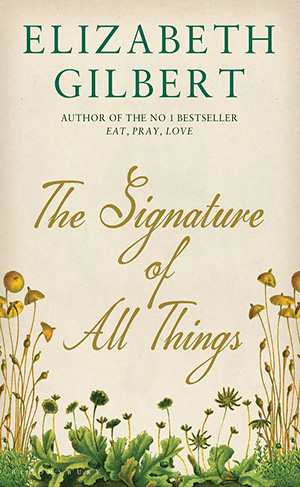I never thought I’d get excited by a novel about botany, but The Signature of All Things proved me wrong. Firstly, Elizabeth Gilbert is an outstanding storyteller: funny, insightful and ambitious. Equally compelling is the novel’s unlikely heroine, Alma Whittaker, a multi-layered and unusual character and a woman with a brilliant scientific brain born in the wrong century.
The Signature of All Things begins in England in the 1760s with the rags-to-riches story of Alma’s father, Henry Whittaker, the son of an orchard man at Kew Gardens, who grows up in extreme poverty surrounded by equally extreme wealth. Unlike his father who is ‘forceless’ and ‘complacent’, Henry is ambitious, cynical and willing to do anything to get rich.
Through hard work and bendy morals, Henry builds up an empire in the trade of exotic plants and becomes ‘one of the three wealthiest men in the Western Hemisphere’. He strategically marries a cold, intelligent Dutch woman, with whom he has Alma.
What Alma lacks in physical beauty is made up for by her exceptional intelligence and her first-class education. Her adopted sister Prudence is her opposite, a striking beauty, lacking in education, although not in intelligence. Their father is ruthlessly insensitive.
‘Alma! Come instantly! You are requested to be seen!’
Alma rushed into the atrium, bright with expectation. The stranger looked at her for a moment, then burst out laughing. He said, ‘No, you bloody fool – that’s not what I meant! I want to see the pretty one!’
Without a trace of rebuke, Henry replied, ‘Oh, so you’re interested in Our Little Exquisite, then? Prudence, come in here! You are requested to be seen!’ […]
‘There we are!’ said the guest, looking over Prudence as though pricing her out. ‘Oh, she is splendid, isn’t she? I had wondered. I had suspected everyone might be exaggerating.’
Henry waved his hand dismissively. ‘Ah, you make too much of Prudence,’ he said. ‘To my mind, the homely one is worth ten of the pretty one.’
So, you see, it is quite possible that both girls suffered equally.
Growing up on her parents’ vast estate in Philadelphia surrounded mainly by scholars and scientists, Alma becomes interested in botany and dedicates her life to studying moss, a micro-cosmos not unlike her own sheltered, secluded existence. Below the surface simmer Alma’s sexual longings and unrequited loves.
Mosses were typically defined by what they lacked, not by what they were, and, indeed, they lacked much. Mosses bore no fruit. Mosses had no roots. Mosses could grow no than a few inches tall, for they contained no internal cellular skeleton with which to support themselves. Mosses could not transport water within their bodies. Mosses did not even engage in sex.
Our heroine, an individual ‘compelled by a desire for comprehension’, turns out to be an excellent, even ground-breaking, scientist, but as a woman in the late 1700s she’s weighed down by prejudice and self-doubt, lacking the brazen self-confidence of her male counterparts. It makes you wonder how many brilliant women in the history of the world have suffered her fate.
Gilbert’s novel is a superb escape to a different time and to exotic places. On the quest for riches, plants or inner peace, we are transported from England to Peru, Tahiti, Philadelphia and Holland. Alma’s story is intertwined with that of the Enlightenment and deals with the conflicting ideas of superstition, religion and science, but it does so with playfulness and humour which makes the book utterly readable and not at all the dull book it so easily could have been.
The Signature of All Things by Elizabeth Gilbert is published by Bloomsbury, 580 pages.





